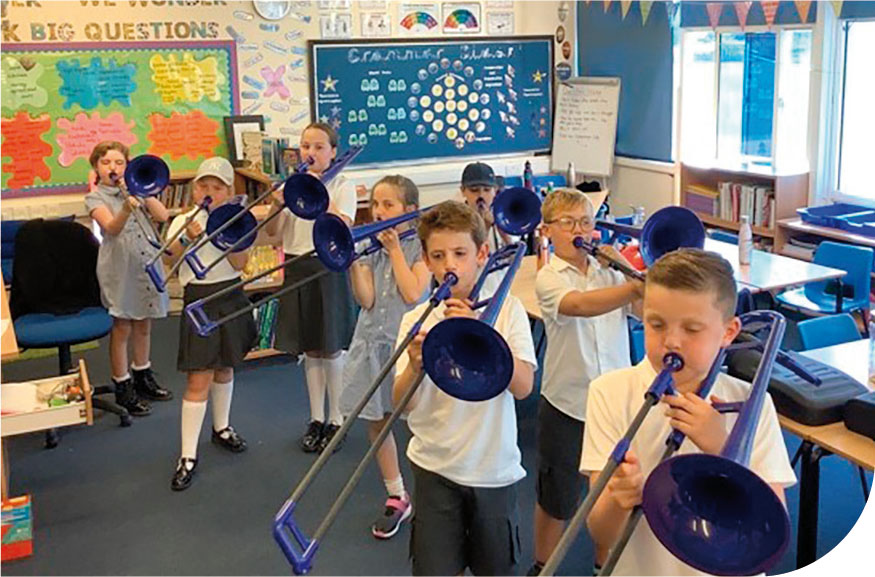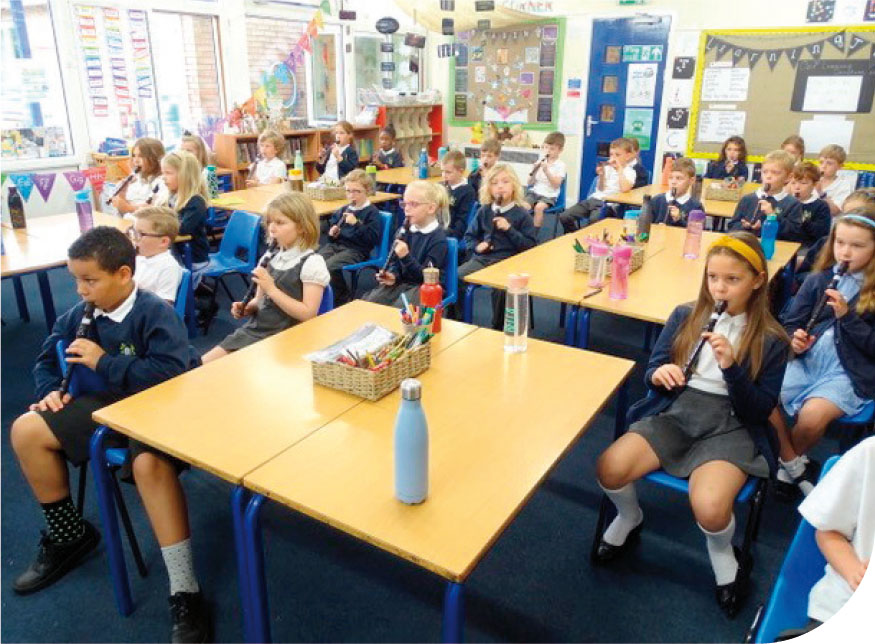
HC: Can you give me an overview of the scheme you've devised?
SW: Every child plays a musical instrument daily in class with their class teacher, and I, as the music specialist, teach the next lesson to build the skills on that instrument, in addition to the national curriculum skills in composing, listening, appraising, and performing. I ensure that teachers feel confident with their daily practice and understand how the skills progress on each instrument.
HC: Why did you decide to create this programme?
SW: I started my career as a class teacher, then after two years became a full-time primary music specialist. Over the next few years, I completed an MA in Music Education, became a primary music AST (advanced skills teacher), was a support teacher for one county I worked for, and I also worked occasionally as a WCET (whole class ensemble teaching) tutor. Having loved all aspects of my musical career until that point, I found that I didn't really enjoy the role of the WCET tutor. I missed the relationship that I could build with the pupils as a music specialist or class teacher, and there were too many aspects of the role that I found disappointing, such as the teacher often not being present in the room, children forgetting instruments, challenging behaviour, disengagement, and slow progress due to no practice following each session.

© COURTESY BOSBURY CE PRIMARY SCHOOL
Research written about the success of WCET (Fautley, Kinsella and Whittaker, 2017; Hallam, 2019) states that the programme is most successful when the music hub tutor is working in the sessions with the class teacher, when there is a genuine partnership between the WCET provider and the school, when the class teacher receives CPD through the modelling of music lessons and then delivers an extra session during the week, and when there are regular performances to give meaning to the learning. I felt that this wasn't the experience that I was having, and I soon left this post.
More recently, I was working in a school and was the supporting teacher with a visiting music teacher leading a WCET session during one of my music lessons. I could see how much the children were loving it and the sessions were always fun and exciting, but there was no practice between the weekly sessions, so the progress was slow. In the last six years I have returned to class teaching, with music teaching across the school in the afternoons. Because I'm in one school all week, I've been able to build music to be a highly valued subject, with an incredibly supportive head teacher who understands the importance of music and has listened to every suggestion I've made.
I thought I could deliver a WCET-style programme in my school myself, with the support of my headteacher and other staff, and started by teaching the recorder in my class, as we already had plenty in school. I wanted to find a way to give all children equal access to this learning so they could make good progress and stay motivated, so I decided to keep the instruments in school and practise daily for five minutes every morning. I would then teach the next steps in their weekly music lesson for about 15 minutes, before moving on to teach the rest of the national curriculum requirements. By the end of that year, the children had developed confidence and told me how much they enjoyed playing daily, so I decided to roll out the programme to another class.
HC: Why do you prefer to use this model over WCET?
SW: Firstly, we don't have to pay our music hub to provide this service. I also think that the children really benefit from daily practice on their instrument. My aim isn't to make our children fluent performers, but to give them a solid grounding in the experience of playing a variety of instruments so they can make a clearer choice about taking music further. I have identified some real talent through this programme and have been able to suggest to parents that children take an instrument on further or pursue an alternative instrument. I also think that the class teacher is the best person to be involved with the children's musical learning. This model involves me as the specialist music teacher, the children, and their class teacher. I can involve all staff in the planning and delivery of the learning, and I can pop into anyone's class in the morning to ensure that the teacher is feeling confident about the next steps.
HC: Is this kind of scheme possible for non-specialists?
SW: I am a huge advocate for the primary class teacher having the confidence to teach music themselves. I don't think you have to be a specialist to deliver this programme, but I do think you need passion for the subject, a little bit of vision, a good relationship with and support from the headteacher and colleagues, and perhaps experience of how a WCET session works.
HC: What barriers might others face when trying to implement something like this?
SW: I think the biggest barrier would be the support of the headteacher. My head believed in my vision, and I could convince her that I knew what I was doing. The arts are as important to her as they are to me, so she could understand why I thought this was such an important thing to do. She also helped convince other members of staff that it was a positive thing for the whole school. Cost would also be a challenge, but we looked for as much funding as we could get. I started with one instrument and have built it up over the years, and I'm so proud of what we have achieved as a school.
What do the children say?
- ‘I enjoy it a lot because an instrument is soothing’
- ‘I love learning an instrument and it makes me feel happy and excited. I love music, it makes me feel safe’
- ‘It's a good way to start the day’
- ‘I feel happy and proud when I move on to the next piece. I feel more confident’
- ‘I love to learn the ukulele; it makes me happy and is pretty and joyful’
- ‘I feel happy to wake up in the morning to play the ukulele’
And the parents?
- ‘Anything that provides an achievable challenge that stretches them is a wonderful opportunity. We value creativity and application and recognise music as offering both of these characteristics of development’
- ‘Music and art were the main reasons that we chose the school – thank you for making music happen’
- ‘I think the arts and sport are as valuable as academic study and want my children to know that whatever they're good at is important and makes them special. Thank you’
- ‘Great for children whose parents might not be able to afford music lessons’
- ‘He has asked for a recorder for his birthday!’
- ‘A child may not know they are good at playing an instrument unless they are given a chance’
Weekly music schedule at Bosbury (5 classes, 150 pupils)
- Class 1, mixed Reception and Year 1 – 30-minute music lesson with Walker, plus daily singing in their class and continuous access to a varied set of percussion instruments, funded by the Sylvia Short Charity.
- Class 2, mixed Year 1 and 2 – 30-minute music lesson with Walker and practise the ocarina at 9am daily with the class teacher. The ocarinas were funded by the EMI Sound Foundation, and books/CDs were bought by the school.
- Class 3, mixed Year 3 and 4 – 45-minute music lesson with Walker and practise the recorder at 9am daily with the class teacher. The school pays for the resources.
- Class 4, mixed Year 4 and 5 (Walker's class) – An hour's music lesson and practise pBrass instruments daily at 9am. The pBrass were funded by the parents’ association.
- Class 5, mixed Year 5 and 6 – An hour's music lesson with Walker, and practise the ukulele and added tuned percussion at 9am with their class teacher. The children have responsibility to sort this practice time out themselves, with different children leading. The ukuleles were funded by the EMI Sound Foundation, and a parent generously made the ukulele stand.
Outside of class
- Whole school singing assembly, choir and a djembe group.
- Daily listening into assemblies with one piece of music each week, plus a PowerPoint to explain about the music, composer or performer(s).
- Opportunities to perform during the term. At Christmas, all the children play their instruments together for one piece as a whole school, and a parent choir joins the children's choir for one number.








